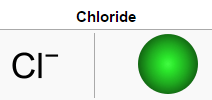Gold is characterised chemically by an extreme indifference to the action of all bodies usually met with in nature. Its simpler compounds are formed with difficulty, and decompose readily, especially when heated. The result is that gold is found in nature chiefly in the metallic form, and the mineralogist has, therefore, few compounds to consider. Gold also forms complex compounds, especially with cyanogen and sulphur. These do not exhibit the ordinary reactions of gold, and are in particular not so readily reduced. The gold in them is not present as an elementary ion, but forms part of complex ions.
Gold forms two series of simple compounds, having the general formulae AuR and AuR3, while doubtful compounds corresponding to AuR2, AuR4, and AuR4, have been declared to exist by Thomsen, Prat, Figuier, and others. These two series are denominated aurous and auric respectively.
Compounds of Gold with the Halogens
Gold forms two series of compounds with the halogens, the general formulae being AuR and AuR3 respectively. Supposed compounds having the formula AuR2 have been described, but are probably mixtures of the series denoted by AuR and AuR3. All these bodies are very unstable, existing throughout only low ranges of temperature, whether in the dry state or in aqueous solution. The chlorides are the most easily formed and the least unstable, the bromides coming next. Their heats of formation are given in the subjoined table in calories:

SULPHIDES OF GOLD
These compounds are prepared as brown or black precipitates by passing sulphuretted hydrogen through a solution of gold chloride. The exact composition of the precipitate varies with the temperature and degree of concentration of the solution, and the amount of free acid present. Levol and Kruss state that Au2S is precipitated in the cold, but that only metallic gold and free sulphur are thrown down from boiling solutions. According to others, Au2S3 is precipitated from cold and Au2S from boiling solutions. It seems probable, however, that free sulphur is always formed in considerable quantities, and whether the solutions are hot or cold, dilute or concentrated, definite compounds are not precipitated, variable mixtures of the two sulphides with free sulphur and metallic gold being formed. Similar precipitates are formed by alkaline sulphides and by sulphides of most of the heavy metals. The sulphides are soluble to some extent in a saturated solution of sulphuretted hydrogen, and are easily soluble in hot solutions of alkaline sulphides or alkalies, forming double salts so that precipitation from alkaline solutions is never complete. The sulphides are readily decomposed into gold and sulphur by the action of heat, the decomposition being complete below 270°. Sulphide of gold is also dissolved at ordinary temperatures by potassium cyanide, and is slowly attacked by mercury with formation of mercury sulphide.
